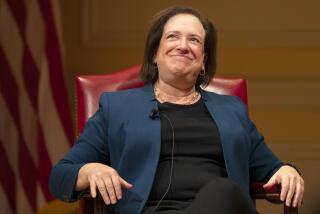Supreme Court Bolsters Protections for Patents
- Share via
In a decision affecting most patents, the Supreme Court on Monday gave inventors wider latitude to sue makers of competing products that don’t exactly copy the original.
The unanimous decision overturned a controversial appeals court ruling and was heralded by inventors and lawyers as the most important concerning patents in decades. “Everyone was holding their breath for this one,” said Washington lawyer Ray Kurz.
The decision affects about 1 million of the 1.2 million patents in effect and hinged on the long-standing “doctrine of equivalents.”
“Since the beginning of our country, patents were seen to be in effect even on so-called equivalent products that might be a little different from what was described in the patent,” said lawyer Jim Carmichael of Los Angeles firm Lyon & Lyon. “It was to prevent someone looking at a patent and saying, ‘That’s a great idea. Let’s see how small a change I can make and bring out a competing product.’”
Suits concerning the doctrine of equivalents were essentially handled case by case, which “made it hard to predict an outcome,” Carmichael said. But in 1999, the appeals court handling patents ruled in a dispute over an air cylinder used in robotics that if a patent is amended during the application process--and almost all are--the doctrine was no longer in effect.
The appeals court said inventors are restricted to the literal wording in the amended part of the patent and can’t take advantage of the doctrine of equivalents. The court said the rule would prevent inventors from attempting to recapture subject matter they relinquished during the application process. The court also said its decision would clarify what each patent covered.
But Justice Anthony Kennedy wrote that allowing the appeals court ruling to stand would “risk destroying the legitimate expectations of inventors in their property.”
Several technology and biotech firms, including Sun Microsystems Inc., Verizon Communications Inc., Pfizer Inc. and Dow Chemical Co., had urged the reversal of the appeals court decision. “In those fields, the technology is evolving so rapidly that it would be easy for someone to get around the scope of a patent as things change,” said Carmichael, who works in Washington and is secretary of the national Assn. of Patent Law Firms.
The association filed a brief in support of the reversal.
But other large companies, such as Intel Corp., IBM Corp. and Genentech Inc. urged the Supreme Court to uphold the appeals court ruling, saying it would ward off frivolous patent suits.
The decision did not come down entirely on inventors’ side. The Supreme Court said an amended patent does not automatically get doctrine-of-equivalents protection. The inventor will have to show that changes to the patent are more cosmetic than substantial.
The decision came in Festo vs. Shoketsu Kinzoku Kogyo Kabushiki, a case that has been in the courts for 14 years. Festo Co., a Long Island, N.Y., manufacturer of robotics and assembly line equipment, sued its Tokyo-based rival, commonly known as SMC, for allegedly copying a patented type of air cylinder.
Festo won the first round in district court but lost on appeal. Now the case, unless settled, will return to district court for a new hearing.
Festo and SMC officials did not respond to requests for comment.
*
Bloomberg News was used in compiling this report.







